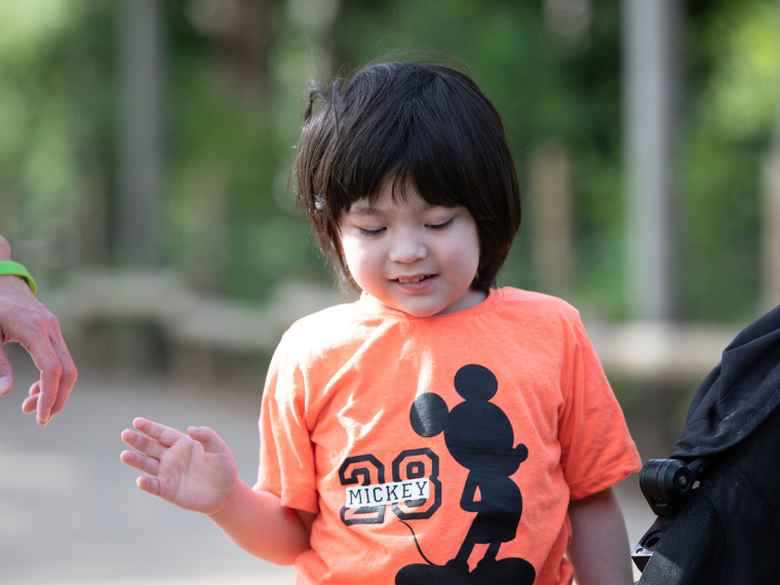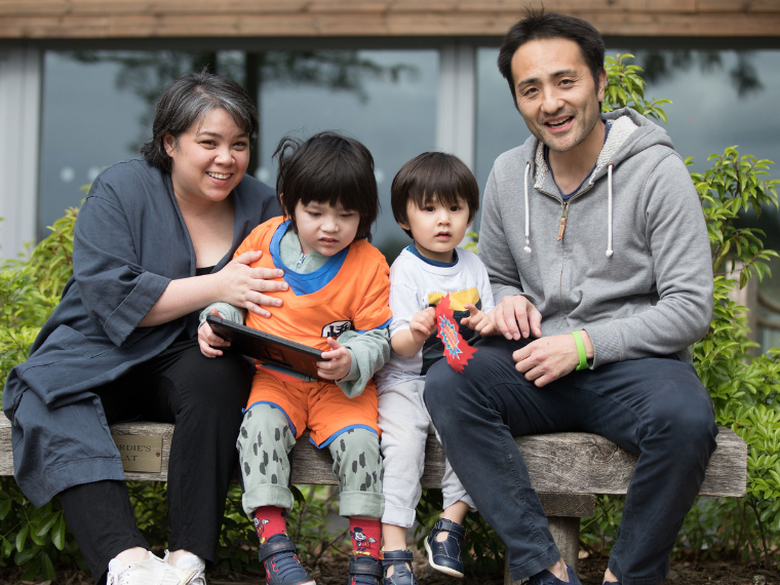Joe
Joe lives with his parents, Emily and Toru, and younger brother Tad, in London. The family relocated from Singapore to the UK, following Joe’s diagnosis of Dravet Syndrome.
Joe’s Mum, Emily, shares more of their story below.
Diagnosis
Joe had his first seizure after his second batch of vaccinations when he was four months old and we were living in Singapore. It continued for over three hours, and he was put in intensive care for a week. After that, he would go into status epilepticus every time he got ill, with the seizures lasting up to an hour. He would stay in hospital for a while, and often in the Intensive Care Unit (ICU).
During his second big stay in ICU, while Joe was very poorly, we asked what the worst-case scenario was and the consultants said it could be Dravet Syndrome. The doctors advised us not to Google it but of course we did, and immediately asked for the genetic test.
Eventually, Joe tested positive for the SCN1A mutation, while his dad and I tested negative. We were told very little about the test and the results – the genetic report and diagnosis weren’t explained to us in any detail at the time.
Relocating to the UK
We realised that Singapore would be less likely to accommodate the complex needs of Dravet Syndrome in the same joined up way as the UK, so we quickly decided to move to London to be with my family, and to give Joe the care he needs.
Before we moved, we managed our own medical and development information, independently. We were doing all the research and approaching the doctors for changes in medication. We had three different doctors and always compared information. We were paying privately for occupational and speech therapies with no idea of what he needed or what to expect from it.
The biggest thing for us was to manage Joe’s triggers - hot temperatures, sensory overload, stripe patterns, excitement - all we could do was keep him at home and make him sleep. This resulted in reduced hospital stays and medication, but he didn't have any quality of life, which had a profoundly depressing effect on us as a family.
Moving to the UK, we had to adjust to accept help where it was offered. We learned to lean on others a bit more, and not let the fear of him seizing control us. We are still not super adventurous, but we go on trips now. He loves being outside, so we are out in most weather and we were able to let go enough to have another child, Joe’s younger brother, Tad, which has helped Joe enormously, even if he doesn't think so!
Challenges
Joe has around 50-100 myoclonic jerks every day and they get worse when he's hot, excited, tired, ill, shocked or is sensory overloaded. We have never been able to control them with medication, so we manage his triggers as best we can. Every activity is therefore an exercise in risk management. Spontaneity doesn't figure in our day-to-day life!
Sleep is a big issue in our house. Joe wakes up at least once or twice each night and medication doesn't seem to help. Sometimes he's awake for 6-7 hours, which means he sleeps through school. It is difficult to manage Tad's sleep as Joe is very noisy because he's frustrated and over stimulated during the night.
Until Joe went to school, we couldn't trust his care to anyone because they were either not confident to manage his triggers, or not aware of them. When we were in Singapore, we took turns to work from home and supervise him, but when we moved to the UK, I wasn’t able to work and I really missed it. Since Joe went to school though, Toru and I have been able to work together, building our own business, so that we can manage our time around Joe and Tad.
We live just down the road from Yai and Granddad (Granny and Grandad - my mum is Thai), and they see a lot of what our life is like, but no one can really know what life is like for us. They help us out where they can, and provide a lot of emotional support. It was difficult for them to come to terms with the developmental aspect of Joe's diagnosis, but the more time they spend with him, the more they can see his gifts and his magic that he brings to everyone he meets.
It's super hard for his Japanese grandparents, because we can't travel to see them. We are not able to take a 14-hour flight in case of seizure, and they cannot come over here often. But they understand he's where he needs to be right now.
Support from DSUK
Before we moved to the UK, shortly after Joe’s diagnosis, I booked flights from Singapore to attend the Dravet Syndrome UK conference.

I was overwhelmed with the support there. I'm not a group person usually and I didn't speak to hardly anyone, but I suddenly felt like we weren't alone. Knowing that you don't have to rely solely on your own research or connections to get reliable information is priceless.
Since relocating, we’ve also attended the Annual Family Weekend. It’s been so liberating to go somewhere with Joe and not be beside ourselves with anxiety about what to do in an emergency. The family party is great because everyone just understands what living with Dravet Syndrome is like, even though we all have different stories. It's so lovely to not have to explain everything to everyone!
The best bit is the community. The online forum is buzzing with information that you can't get from doctors, and emotional support and a bit of 'same here' which helps you feel less alone and that you're on the right track.
We are now a support family with Dravet Syndrome UK, and are more than happy to provide a listening ear to any family diagnosed with Dravet Syndrome, including those who have, like us, relocated to the UK from abroad.
An instinctively empathetic little boy
Joe is non-verbal, but he can make himself understood, and often he knows instinctively who to approach to get what he wants. Joe is incredibly empathetic and warms to others who are like him. He doesn't learn the things you want him to learn, but if he's interested in learning something else, he keeps going and trying until he has nailed it. I model myself on Joe these days, he uses his energy a lot smarter than I do!
I personally am very grateful for Joe because he has made me much more present. I used to struggle with my mental health and always thinking of things that might happen, or things I wished I could change, but now I have Joe I take things as they come. I make sure I take in every moment with him. My husband Toru and I talk about and reflect on our time with the kids all the time. We want to remember it now, and not later.

